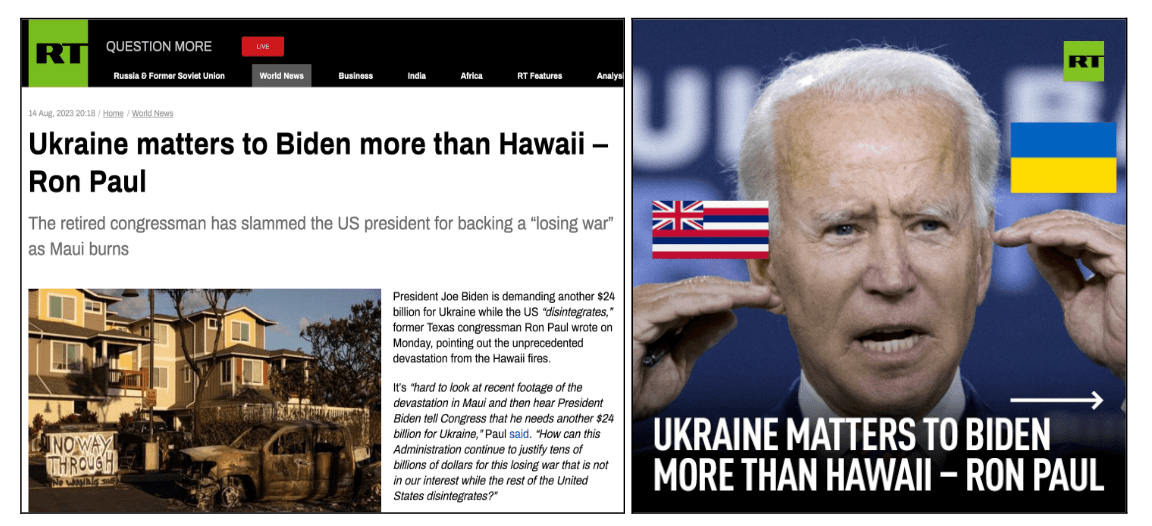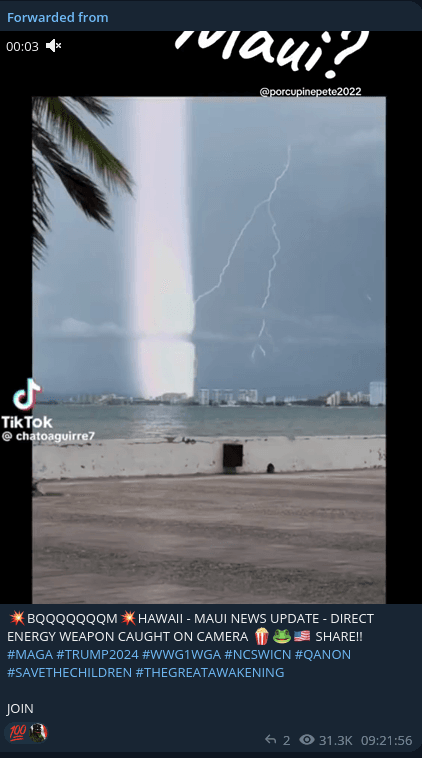![]()
Foreign and domestic influence actors are capitalizing on the Hawaii wildfires to advance their own objectives. Russian and Chinese actors are leveraging shared narratives, asserting that the US prioritizes military spending over citizens' welfare, almost certainly aiming to curtail US defense expenditure in relation to Ukraine and Taiwan, potentially affecting the 2024 US elections. Influence actors are also engaging in disinformation campaigns suggesting that the US government caused the wildfires using weather or energy weapons, with a possible feedback loop between Chinese state-sponsored and domestic violent extremist (DVE) influence operations.
Russian state-funded media is amplifying genuine US domestic concerns about the wildfire response, emphasizing parallels between US aid to Ukraine and assistance during the Hawaii wildfires, almost certainly to undermine support for Ukraine and erode confidence in the Biden administration. A Chinese government-aligned covert network is spreading disinformation attributing the wildfires to a "weather weapon," while Chinese state media is accusing the US government of valuing military spending over citizens' safety. These narratives aim to provoke anger and domestic pressure to reduce defense expenditure.
 RT article and social media post graphic boosting an opinion from former Rep. Ron Paul, arguing that Ukraine matters to Biden more than Hawaii (Source: RT)
RT article and social media post graphic boosting an opinion from former Rep. Ron Paul, arguing that Ukraine matters to Biden more than Hawaii (Source: RT)
US DVEs are promoting disinformation that the US government deliberately ignited the wildfires using a directed energy weapon, with some DVEs weaving in anti-Semitic conspiracy theories regarding plans to acquire and sell land. These narratives very likely intend to undermine government emergency responses, propagate anti-government sentiment, and advance anti-Semitic ideologies.
 Post with purported evidence of a directed energy weapon attack on Maui from a source linked to the DVE conspiracy movement qAnon (Source: Telegram)
Post with purported evidence of a directed energy weapon attack on Maui from a source linked to the DVE conspiracy movement qAnon (Source: Telegram)
The proliferation of disinformation highlights influence actors' opportunism and speed in shaping the information landscape. Counter-influence strategies, awareness campaigns, and psychological impact consideration are advised to mitigate the influence of these narratives. The convergence of influence narratives, intended to influence defense spending, aid policies, and election outcomes, is very likely to escalate in the lead-up to the 2024 US presidential elections.
Beyond political manipulation, exploiting natural disasters risks eroding trust in disaster relief efforts and agencies like FEMA. Effective strategic communications, preemptive identification of emerging narratives, and reliance on credible scientific and fact-checking institutions are crucial during such events.
To read the entire analysis with endnotes, click here to download the report as a PDF.
Article Link: Converging Narratives on Hawaii Wildfires Advance Different Influencers’ Objectives | Recorded Future